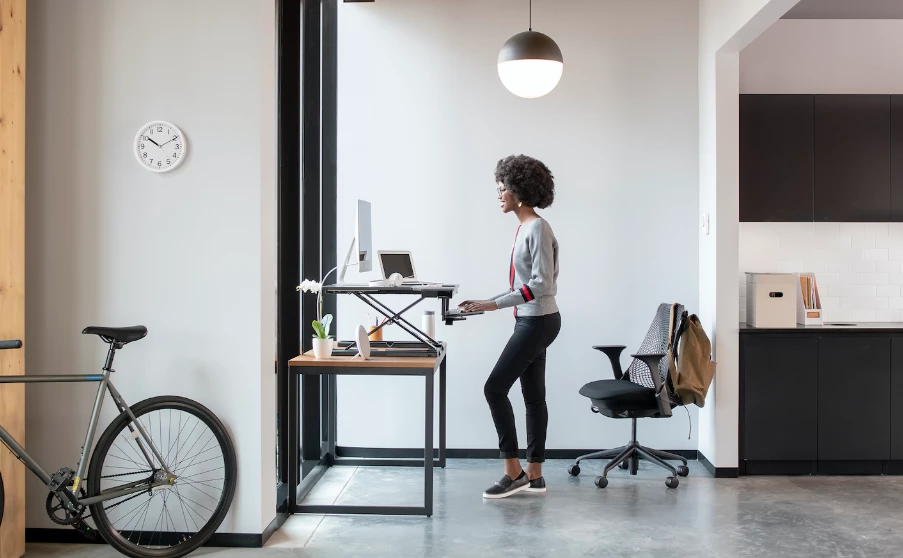
Member Article
What can businesses learn from this year’s International Week of Happiness at Work?
By Kleopatra Kivrakidou, Channel Marketing Manager at Ergotron
Happiness at work hasn’t always been a great prerogative for employees and in fact still isn’t in some cases. Fennande van der Meulen and Maartje Wolff, the co-founders of Happy Office, feel this should change, which is why they declared the third week of September every year the International Week of Happiness at Work. They believe that workplace happiness should be a top priority for all organisations - large and small, national and international.
Over the past decade, happiness at work has become a progressively ‘hot’ topic. According to Benefits Pro Magazine, over 50% of employees in the US now place more importance on workplace happiness than pay. With trends from the practical, like bike to work schemes, to the slightly more outlandish, like slides in the office (Google’s handiwork), workplace contentment has almost become fashionable. Organisations are using it to create a brand, or reputation, for being fun and supportive employers. But the stakes are much higher and burrow much deeper than just a bit of fun in the office. In a recent report, Gallup found that more than half of employees are open to new opportunities, largely pre-empted by feelings of discontent. The promise of workplace happiness has clearly become a key contender for prospective employees when job-hunting.
But what are employees actually looking for? Is it slides that can save them a walk down a flight of stairs? Is it even more tangible perks like free lunches delivered to the office? None of these sorts of benefits offer anything more substantial than a fleeting moment of pleasure which, as Greater Good Magazine rightly points out, cannot constitute for long-term happiness. Happiness must be defined as more an overarching richness of life, where you experience a mixture of emotions, from contentment to anger, all while maintaining a sense of purpose. Businesses should be taking this psychology into consideration when they are brainstorming new initiatives and schemes to achieve happiness at work. One way of looking at this is to think about the four keys to happiness: purpose, engagement, resilience, and kindness. All of these can be promoted via different training, design and cultural choices, that will have longer term benefits as a result.
Google wasn’t too far off when it decided to install the slides, then. The environment in which we work heavily affects our mood and attitude towards work. Since the introduction in recent years of benefits such as working from home and flexible working, the traditional office environment has come under much scrutiny. According to Gallup, 37% of employees say they would change jobs for one that offered them the ability to work where they want at least part of the time. Now more than ever before, workers are searching to find a healthy work-life balance. In correlation with society’s improved understanding of mental health, so too do concerns over poor mental health and stress levels. Having the choice to work where you want, when you want, can help contribute to this.
To match this, the office space itself must also become more flexible. Many companies are investing in ergonomic principles and furniture as a route to achieving this. Focussing on the individual ergonomic principles of comfort, safety, efficiency and productivity can help businesses analyse their office environment objectively in order to see what changes need to be made. The four core values of ergonomics run much deeper than an offer of a free sandwich - and are very closely linked to the four keys to happiness mentioned earlier.
Ergonomic products, such as sit-to-stand desks and adjustable monitor arms, help bring these principles to life. They are flexible to employees’ needs, which helps boost productivity and keep workers engaged for longer. When comfort levels are increased, it becomes easier to build up physical resilience. And perhaps most importantly, movement-friendly furniture is kind to mental and physical well-being. Encouraging a deeper sense of happiness at work leads not onto to day-to-day health but also to productivity and ultimately career advancement, all of which are truly in the interests of both the business and employee.
While the workforce continues to shape and shift as older generations leave it and millennials and Generation-Z enter it, so too are attitudes towards work. Soon, companies who don’t provide better benefits and schemes for their employees will be left behind. There is no better time than right now for businesses to start placing great importance on happiness at work. In the words of van der Muelen and Wolff, “happy people perform better.”
This was posted in Bdaily's Members' News section by Kleopatra Kivrakidou, Channel Marketing Manager EMEA at Ergotron .
Enjoy the read? Get Bdaily delivered.
Sign up to receive our popular morning National email for free.




 test article 123456789
test article 123456789
 hmcmh89cg45mh98-cg45hm89-
hmcmh89cg45mh98-cg45hm89-
 test456456456456456456
test456456456456456456
 test123123123123123123
test123123123123123123
 test xxxdiosphfjpodskhfiuodsh
test xxxdiosphfjpodskhfiuodsh
 Savour the flavour: North Tyneside Restaurant Week returns for 2024
Savour the flavour: North Tyneside Restaurant Week returns for 2024
 Six steps to finding the right buyer for your business
Six steps to finding the right buyer for your business
 Stephen signs off on a special night
Stephen signs off on a special night
 Life’s a Peachaus: Gillian Ridley Whittle
Life’s a Peachaus: Gillian Ridley Whittle
 Making a splash: Phil Groom
Making a splash: Phil Groom
 Making workplace wellbeing a priority
Making workplace wellbeing a priority
 A record of delivery, a promise of more: Ben Houchen
A record of delivery, a promise of more: Ben Houchen